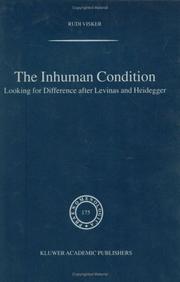| Listing 1 - 5 of 5 |
Sort by
|

ISBN: 9781402061219 9781402061226 Year: 2007 Volume: 183 Publisher: Dordrecht Springer Netherlands
Abstract | Keywords | Export | Availability | Bookmark
 Loading...
Loading...Choose an application
- Reference Manager
- EndNote
- RefWorks (Direct export to RefWorks)
Emmanuel Lévinas est le philosophe de la non-indifférence; il n'est en aucune sorte un philosophe indifférent. Son inquiétude personnelle et engagement politique ont trouvé une expression philosophique dans une quête à deux versants. Dans le versant ontologique, il cherche à montrer que même si l'homme est l'événement de compréhension de l'être, tout l'homme et toute signification ne se réduisent pas à la compréhension de l'être seul. Dans le versant politique, il s'interroge sur la possibilité de soumettre la tendance totalitaire de toute politique à une recherche de justice qui ne dépend pas finalement de la politique même. Mais ces deux versants n'en font qu'un. La découverte d'une signification qui excède la compréhension de l'être - l'éthique - fournit en même temps la source de renouvellement de la justice. Ainsi, par cette double question, Lévinas nous présente les fils conducteurs de notre enquête : une signification au-delà de la compréhension de l'être et sa portée éthique, que nous appelons « langage » et que nous explorons dans la perspective de son importance politique. Les études analytiques dans lesquelles les notions de politique et de langage fonctionnent comme clef d'interprétation mutuelle débouchent sur une critique centrée sur deux problèmes : l'impossibilité d'interpréter la signifiance de l'autre et le danger inhérent à la conception d'une justice dépassant l'Etat.

ISBN: 1402041241 9781402041242 140204125X 9781402041259 Year: 2005 Publisher: Dordrecht Springer
Abstract | Keywords | Export | Availability | Bookmark
 Loading...
Loading...Choose an application
- Reference Manager
- EndNote
- RefWorks (Direct export to RefWorks)
The importance of Emmanuel Levinas's thinking is well established in contemporary philosophy. Especially after the publication of his mast- pieces Totalité et infini (1961) and Autrement qu'être ou au-delà de l'essence (1974), Levinas's philosophy has acquired a world-wide recognition, being largely considered as marking a distinct epoch in the development of Continental Philosophy. Levinas's works are now widely translated and the international cir- lation of his ideas makes him an avant-garde figure of contemporary phil- ophy. However, the spreading of Levinas's philosophy into diverse areas of present-day thinking surpasses the frontiers of the phenomenological mo- ment. The concrete impact of the Levinasian philosophy upon the various directions of thinking - from ontology and ethics to Jewish thought, theo- gy, aesthetics or feminism - attests moreover the great significance of this singular figure of our times. For more than three decades now his philosophy has come to be the subject of many doctoral theses, articles and books. The complete Levinas bibliography counts currently thousands of titles in more than ten l- guages. The important contribution that a Levinas Concordance would bring as a valuable instrument for exegetes, researchers, translators etc. is obvious in such a prolific scholarly field.
Philosophy --- Metaphysics --- General ethics --- Religious studies --- ethiek --- filosofie --- godsdienstfilosofie --- existentialisme --- metafysica --- Levinas, Emmanuel --- Lévinas, Emmanuel --- Concordances. --- EPUB-LIV-FT LIVPHILO SPRINGER-B --- Lévinas, Emmanuel

ISBN: 1402028253 140202827X 9781402028274 1402028261 1280411929 9786610411924 9400789262 9781402028250 9781402028267 Year: 2004 Volume: 175 Publisher: Dordrecht ; London : Kluwer Academic,
Abstract | Keywords | Export | Availability | Bookmark
 Loading...
Loading...Choose an application
- Reference Manager
- EndNote
- RefWorks (Direct export to RefWorks)
At the origin of this volume, a simple question: what to make of that surprisingly monotonous series of statements produced by our societies and our philosophers that all converge in one theme - the importance of difference? To clarify the meaning of the difference at stake here, we have tried to rephrase it in terms of the two major and mutually competing paradigms provided by the history of phenomenology only to find both of them equally unable to accommodate this difference without violence. Neither the ethical nor the ontological approach can account for a subject that insists on playing a part of its own rather than following the script provided for it by either Being or the Good. What appears to be, from a Heideggerian or Levinasian perspective, an unwillingness to open up to what offers to deliver us from the condition of subjectivity is analysed in these pages as a structure in its own right. Far from being the wilful, indifferent and irresponsive being its critics have portrayed it to be, the so-called 'postmodern' subject is essentially finite, not even able to assume the transcendence to which it owes its singularity. This inability is not a lack - it points instead to a certain unthought shared by both Heidegger and Levinas which sets the terms for a discussion no longer our own. Instead of blaming Heidegger for underdeveloping 'being-with', we should rather stress that his account of mineness may be, in the light of contemporary philosophy, what stands most in need of revision. And, instead of hailing Levinas as the critic whose stress on the alterity of the Other corrects Heidegger's existential solipsism, the problems into which Levinas runs in defining that alterity call for a different diagnosis and a corresponding change in the course that phenomenology has taken since. Instead of preoccupying itself with the invisible, we should focus on the structures of visibility that protect us from its terror. The result? An account of difference that is neither ontological nor ethical, but 'mè-ontological', and that can help us understand some of the problems our societies have come to face (racism, sexism, multiculturalism, pluralism). And, in the wake of this, an unexpected defence of what is at stake in postmodernism and in the question it has refused to take lightly: who are we? Finally, an homage to Arendt and Lyotard who, if read through each other's lenses, give an exact articulation to the question with which our age struggles: how to think the 'human condition' once one realizes that there is an 'inhuman' side to it which, instead of being its mere negation, turns out to be that without which it would come to lose its humanity?
Philosophy --- Metaphysics --- filosofie --- existentialisme --- metafysica --- Levinas, Emmanuel --- Heidegger, Martin --- Difference (Philosophy) --- Philosophy. --- Mental philosophy --- Humanities
Book
ISBN: 9781402093470 9781402093463 Year: 2009 Volume: 20 Publisher: Dordrecht [etc.] Springer
Abstract | Keywords | Export | Availability | Bookmark
 Loading...
Loading...Choose an application
- Reference Manager
- EndNote
- RefWorks (Direct export to RefWorks)
Levinas's ethical metaphysics is essentially a meditation on what makes ethical agency possible - that which enables us to act in the interest of another, to put the well-being of another before our own. This line of questioning found its inception in and drew its inspiration from the mass atrocities that occurred during the Second World War. The Holocaust , like the Cambodian genocide, or those in Rwanda and Srebrenica, exemplifies what have come to be known as the never again' situations. After these events, we looked back each time, with varying degrees of incomprehension, horror, anger and shame, asking ourselves how we could possibly have let it all happen again. And yet, atrocity crimes are still rampant. After Rwanda (1994) and Bosnia-Herzegovina (1992-1995), came Kosovo (1999) and Darfur (2003). In our present-day world , hate crimes motivated by racial, sexual, or other prejudice, and mass hate such as genocide and terror, are on the rise (think, for example, of Burma, Zimbabwe, Sri Lanka and North Korea). A critical revaluation of the conditions of possibility of ethical agency is therefore more necessary than ever. This volume is committed to the possibility of never again'. It is dedicated to all the victims - living and dead - of what Levinas calls the sober, Cain-like coldness' at the root of all crime against humanity , as much as every singular crime against another human being .
ethiek --- filosofie --- General ethics --- existentialisme --- godsdienstfilosofie --- Philosophy --- Religious studies --- Levinas, Emmanuel --- Ethics --- Passivity (Psychology) --- Passive behavior --- Passivism --- Psychology --- Deontology --- Ethics, Primitive --- Ethology --- Moral philosophy --- Morality --- Morals --- Philosophy, Moral --- Science, Moral --- Values --- Lévinas, Emmanuel. --- Lévinas, E. --- Leṿinas, ʻImanuʼel --- Levinas, Emani︠u︡el --- לוינס׳ עמנואל --- לוינס, עמנואל --- Līfīnās, Īmānwāl --- ليفيناس، إيمانوال --- Lévinas, Emmanuel
Multi
ISBN: 9789020969399 9020969390 9789020983951 Year: 2007 Publisher: Heverlee Brussel LannooCampus CANON-Cultuurcel
Abstract | Keywords | Export | Availability | Bookmark
 Loading...
Loading...Choose an application
- Reference Manager
- EndNote
- RefWorks (Direct export to RefWorks)
Op de dvd worden Kader Abdolah, Durre Ahmad en Cyrille Vael uitvoerig bevraagd over de noodzaak van verbeelding, droom en symboliek. Visueel antropoloog Laurent Van Lancker brengt hen in beeld. Meer dan ooit is er nood aan interculturele dialoog. Kinderen kunnen best van jongs af in die dialoog opgevoed worden. Het onderwijs zou de grote voortrekker moeten zijn. Maar waar halen leerkrachten hiervoor de inspiratie? Marc Colpaert zet hen op weg. Vertrekkend vanuit zijn persoonlijk verhaal en rijke levenservaring betrekt hij de lezer op zijn zoektocht naar de plaats en de betekenis van de ander. De queeste voert ons weg uit de filosofische en psychologische dwalingen van de 20ste eeuw. Martin Buber, Emmanuel Levinas en Ivan Boszormenyi-Nagy worden op een ongebruikelijke manier voorgesteld en getoetst op hun betekenis voor de interculturele dialoog. Zij zijn een opstap naar nieuwe manieren van werkelijkheidsbeleving, die beeldrijk verwoord worden door schrijvers en kunstenaars als Edwin Jacobs, Karen Armstrong, Raimon Panikkar, Durre Ahmad, Kader Abdolah, Chokri ben Chikha en vele anderen. De conclusie is dat je de werkelijkheid niet alleen kunt vatten met de taal van de rede, met de logos. Elke cultuur geeft aan dat zingeving gerealiseerd wordt vanuit een ander taalgebruik, vanuit de taal van de mythos.
Interculturele opvoeding --- Intercultureel onderwijs --- Multicultureel onderwjs --- Lerarenopleiding --- 454.6 --- intercultureel onderwijs --- KHM --- interculturele opvoeding --- 37.017 --- #GGSB: Catechese (geloofsopvoeding) --- #GGSB: Geloof --- #GGSB: Pastoraal --- 734 Multicultureel onderwijs --- #KVHA:Interculturaliteit --- #KVHA:Interculturele communicatie --- #KVHA:Interculturele opvoeding --- #KVHA:Onderwijskunde --- 130 --- 371 --- cultuurfilosofie --- 130.2 --- 37 --- Abdolah Kader --- Ahmad Durre --- Armstrong Karen --- Boszormenyi-Nagy Ivan --- Buber Martin --- Jacobs Edwin --- Levinas Emmanuel --- Panikkar Raimon --- ben Chikha Chokri --- creativiteit --- filosofie --- lerarenopleiding --- onderwijs --- verbeelding --- 313 --- beeldvorming --- cultuurverschillen --- gelijke kansen onderwijs --- interculturalisatie --- symbolen --- 474.6 --- Creativiteit --- Godsdienst --- Koran --- Kunst --- Levinas, Emmanuel --- Mystiek --- Taoïsme --- Troje --- Volksgeloof --- Wetenschap --- intercultureel onderwijs (ler) --- 071293.jpg --- sociale opvoeding --- 37.017 Opvoedingsidealen --- Opvoedingsidealen --- Cultuurfilosofie. Cultuurpsychologie --- Onderwijskunde --- Rassen- en minderhedenvraagstuk - Vluchtelingenvraagstuk --- (zie ook: Mondiale vorming) --- (zie ook: onderwijs (wetenschap)) --- 008 --- 37.03 --- Philosophy and psychology of culture --- Teaching --- Islam --- departement Gezondheidszorg 07 --- 371.3:7 --- Onderwijs en diversiteit --- DVD's --- Interculturaliteit en beeldvorming --- Onderwijs ; leermethoden ; architectuur en kunst --- Contains audio-visual material --- Sociale agogiek --- Vrijetijds-, toerisme- en cultuuragologie. --- Intercultureel onderwijs. --- interculturaliteit --- islam --- Multicultural education --- Imagination --- Myth --- Study and teaching --- Opvoeding en onderwijs --- Interculturele pedagogiek --- Multiculturaliteit --- Onderwijs --- multiculturele samenleving --- Interculturaliteit --- 37.014 --- 071294.jpg --- 370 --- onderwijsfilosofie --- Sociology of culture --- Sociology of education --- Didactics of social education --- Primary education --- Secondary education --- Didactics --- Opvoeding --- Multiculturalisme --- Musiceren --- Pedagogiek --- Statistische gegevens --- Sport --- Catechese (geloofsopvoeding) --- Geloof --- Pastoraal --- Culture --- Philosophy --- Imagination (Philosophy) --- Intercultural communication
| Listing 1 - 5 of 5 |
Sort by
|

 Search
Search Feedback
Feedback About
About Help
Help News
News